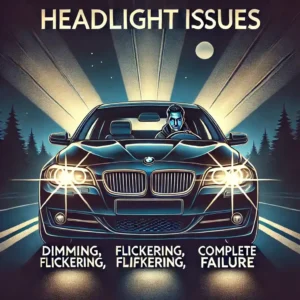7 Warning Signs Your BMW Electrical System Needs Immediate Attention
The BMW electrical system represents a modern engineering masterpiece that enables power distribution to engine control modules and luxury features in your BMW driving experience. Failure to address warning signs from the electrical system will result in both financial expenses and unexpected breakdowns together with safety hazards.
At The Car Lab Auto Repair Center, our certified technicians specialize in diagnosing and resolving BMW Electrical System issues, ensuring your vehicle stays in peak condition.
Below, we dive deep into the 7 critical warning signs every BMW owner must recognize and why acting fast can save you thousands.
Table of Contents
Toggle1. Car Won’t Start: Clicking, Silence, or Intermittent Failure
BMW Electrical System problems often result in BMWs that fail to start. BMW Engine Repairs may also be necessary if underlying mechanical issues contribute to starting failures. If your car refuses to crank or only clicks, the problem could stem from:
- Dead or Weak Battery: Corroded terminals, old age, or parasitic drains (e.g., a trunk light that stays on) can kill your battery.
- Faulty Starter Motor: Listen for repetitive clicking—this often points to a failing starter or poor electrical connections.
- Alternator Failure: Even with a fresh battery installed the vehicle will experience fast battery depletion when the alternator fails to charge.
Pro Tip: People can check battery voltage by using a multimeter. Confirmation of a healthy battery requires measurement at 12.6 volts when idle but operation occurs within the range of 13.7 to 14.7 volts. If readings are off, visit The Car Lab Auto Repair Center for professional battery troubleshooting.
2. Dashboard Lights: Electrical Fault Warnings

Modern BMWs use advanced sensors to monitor the electrical system. Warning messages like “Electrical Malfunction” or “Battery Discharge” indicate.
Common BMW Repairs often involve:
- Faulty Sensors: Malfunctioning oxygen or crankshaft sensors (common in BMW wiring problems) can trigger false alarms.
- Control Module Failures: The Body Control Module (BCM) or Engine Control Unit (ECU) requires either reprogramming or an entirely new unit replacement.
- Voltage Irregularities: The system becomes confused whenever an alternator malfunctions or wire corrosion occurs.
Never ignore these alerts; they’re your car’s way of saying, “Get this checked!” To accurately diagnose electrical issues, trust experts familiar with BMW ECU programming.
3. Headlight Issues: Dimming, Flickering, or Complete Failure
Headlight malfunctions cause more issues than simple discomfort because they create real safety threats on the road. If your BMW’s headlights behave erratically:
- Check the Wiring: Frayed wires or loose connectors (common in older models with BMW wiring problems) disrupt power flow.
- Test the Alternator: Weak alternators can’t sustain consistent voltage, causing lights to dim when idle.
- Inspect Bulbs and Ballasts: Xenon or LED headlights rely on ballasts that often fail due to moisture or age.
The Car Lab Auto Repair Center advises customers to choose Genuine BMW Parts for replacement parts to achieve both maximum compatibility and extended durability.
4. Frequent Battery Drain or Short Lifespan
Batteries do not always cause repeated death to your device. Look for:
- Parasitic Drains: A malfunctioning infotainment system, glove box light, or aftermarket accessories can drain power overnight.
- Faulty Alternator: A failing alternator won’t recharge the battery properly, leading to premature failure.
- Corroded Ground Wires: Poor grounding creates resistance, forcing the battery to work harder.
5. Blown Fuses: Recurring or Unexplained Failures
Blown fuses are a telltale sign of deeper BMW Electrical System issues. Causes include:
- Overloaded Circuits: Aftermarket accessories (e.g., dash cams) may draw too much power.
- Short Circuits: Exposed wires touching metal frames can trigger sparks and fuse failures.
- Faulty Components: A malfunctioning window motor or blower fan can overload a circuit.
6. Erratic Sensor Behavior or False Alarms
Faulty sensors are a hallmark of BMW Electrical System troubles.
Symptoms include:
- Check Engine Light: Your check engine light signals through a malfunctioning oxygen sensor or mass airflow sensor.
- Inaccurate Fuel Gauge: Your fuel level sensor failure may result in a stranded situation.
- ADAS Malfunctions: Lane-keep assist or adaptive cruise control may disabled due to sensor errors.
7. Alternator Whining, Burning Smells, or Battery Warnings
A failing alternator is a critical BMW Electrical System emergency. Watch for:
- Whining Noises: Worn alternator bearings create a high-pitched sound.
- Burning Smells: Overheating alternators or frayed wiring can produce a distinct odor.
- Dashboard Warnings: “Charge Battery” or “Alternator Fault” messages demand immediate action.
Conclusion
Your BMW’s electrical system is intricate, but vigilance can prevent disasters. From battery troubleshooting to resolving BMW wiring problems, timely action saves you from expensive BMW Engine Repairs or tow truck bills.
The Car Lab Auto Repair Center handles common BMW repair needs by installing authentic BMW components for exact performance and dependability.
Frequently Asked Question
Why is my BMW battery continuously draining?
Chronic battery drain often stems from parasitic loads, a faulty alternator, or aging wiring. Our battery troubleshooting services at The Car Lab Auto Repair Center isolate the cause in minutes.
Can a bad alternator damage other components?
Yes! A failing alternator can overwork the battery, fry the fuse box, and even harm the ECU. Early alternator repair prevents collateral damage.
Are aftermarket parts safe for BMW electrical repairs?
We strongly recommend Genuine BMW Parts. Aftermarket components may lack precision, leading to recurring electrical fault warnings or compatibility issues.

Address
24b street, Al qouz Industrial area 2, Dubai


Phone
+971 4 3365597


info@thecarlab.ae
Services
Contcat Us
-
800 8257
-
+971 4 3365597
-
info@thecarlab.ae
-
24b street, Al qouz Industrial area 2, Dubai
-
Open daily from 8:00 am - 8:00 pm
-
24/7 Customer Care Service

